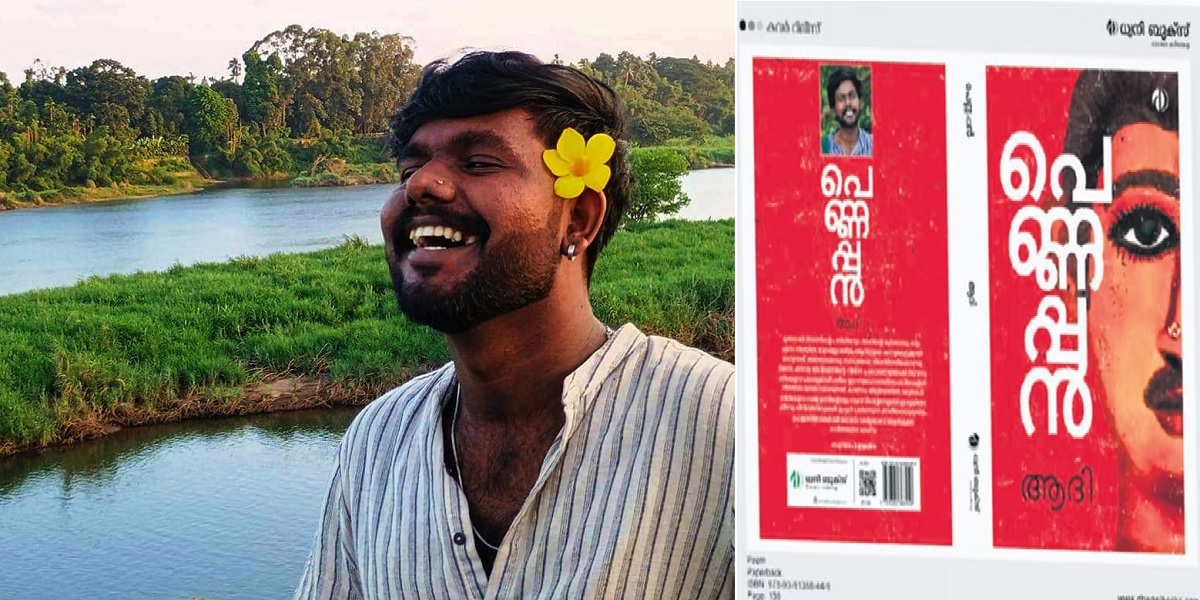Interview: Queer but true — People cry foul at injustice in films, little justice in reality

Aadi has been awarded Kerala Sahitya Akademi Award for his poetry collection ‘Pennappan’ in the Young Poets category.
Aadi, a PhD student at the Sree Sankaracharya University of Sanskrit in Kaladi, Ernakulam, and a queer activist, has been awarded the prestigious Kerala Sahitya Akademi Award for his poetry collection ‘Pennappan’ in the Young Poets category.
This collection, recently included in the syllabi of both Mahatma Gandhi and Calicut universities, has sparked widespread discussions. Pennappan has also been chosen for the award constituted by the A Ayyappan Smaraka Foundation. The award will be presented to Aadi on Monday, 21 October.
In conversation with South First, Aadi shared his inspiring journey, detailing his experiences of overcoming suppression to achieve success as a non-binary writer and activist. Edited excerpts.
Q: The title Pennappan (Feminine Man) has sparked significant controversy. What is the reason behind choosing this title?
A: Pennappan is a poem that tells the story of a father, a mother, and their child. Unlike in my other works, where fathers are often depicted as harsh or violent figures, the father is different here.
He takes on household tasks, like washing the mother’s clothes, and faces questions like, “Are you a woman?” Society mocks him for these so-called feminine traits. The poem explores how the father is seen through the eyes of the child, highlighting the ridicule he endures for not fitting into traditional gender roles.
While I’ve never claimed Pennappan to be my best work, it resonated deeply with the queer community. For many, it’s just another poem but for us, it reflects our lived experiences. After the book was published, the title sparked controversy. In various parts of Kerala, the term pennappan is used to insult queer men, and some felt the title was politically incorrect.
But my poem is not about fitting into boxes of what’s deemed politically right or wrong. Even my life exists beyond the constraints of so-called political correctness.
Also Read: Queer community in Kerala opens up about ‘Kaathal-The Core’
Q: As the first queer person to receive the Kerala Akademi Award, how special is this recognition for you?
A: The award was completely unexpected. I never wrote for accolades. Writing is my livelihood. Becoming part of history brings me immense joy. I penned Pennappan in 2020 during the Covid-19 pandemic, and it gained significant attention on social media. By 2022, it was published in print.
I can’t claim this poem solely as my own. It reflects our (the queer community’s) collective experiences rather than just my creativity. I am not someone who sits in comfort and writes from imagination. Each word represents the untold stories of our lives. How many queer individuals have vanished from society? What has happened to them? Does anyone inquire about their fate?
This poem embodies our existence. So when it received recognition, I felt that, somewhere, we were beginning to find acceptance. The queer community in Kerala has fought for visibility, on the streets, enduring police brutality, combating cyberattacks, and sacrificing lives.
Q: Do you the inclusion of Pennappan Calicut and MG universities’ syllabi as a form of sweet revenge for the atrocities you have faced?
A: At Calicut University, my poem was included as a main paper in the first semester of the Introduction to Malayalam Poetry section, and at MG University, it was featured in the gender studies section. As an activist discussing queer and gender issues, I find this recognition quite casual but I am genuinely happy for the acknowledgment.
The only writer from the community to gain such recognition is Vijayaraja Mallika, who achieved recognition as a transgender writer. Now, many voices are being included.
Also Read: This podcast celebrates and embraces diversity in the natural world
Q: Why did you portray women, especially mothers, differently in your poems, avoiding the typical images of selfless persons or fighters? Is this a conscious decision?
A: In a patriarchal society, mothers are often cast as sacrificial figures, fulfilling roles defined by societal expectations rather than their own needs. While a woman’s role in the family is undeniably significant, I consciously strive to challenge these stereotypes in my poetry.
My verses explore the complexity of women’s experiences, featuring wives who find happiness in their husbands’ deaths, women who openly express love for other women, and mothers who fall in love. They are fully realised human beings, not confined by traditional roles.
While I don’t specifically represent the queer community, my journey is through diverse lives and experiences. My poetry delves into the narratives of marginalised communities, including Dalits, giving voice to their stories.
Q: Mari Selvaraj in his 2018 Tamil film Pariyerum Perumal introduces a father, a folk dancer performing in drag clothing. While such characters attract attention in films, the reality is often different. How does this portrayal contrast with real-life experiences?
A: Society still struggles to accept differences. Political parties often use queer individuals as a PR tool, crafting narratives that suggest the system and society fully support the community. While there have been some changes, much more needs to be done.
Finding a rented accommodation is a significant challenge for queer people in Kerala. When homeowners do agree to rent, they often charge exorbitant rates. Transgender individuals were employed by the Kochi Metro, but many have since left due to insufficient wages that fail to meet their needs. As a result, they are often forced to return to sex work.
People cry or feel inspired to fight against injustice when they see these stories on screen but in reality, there is often little justice or care for the community.
(Edited by Majnu Babu).

